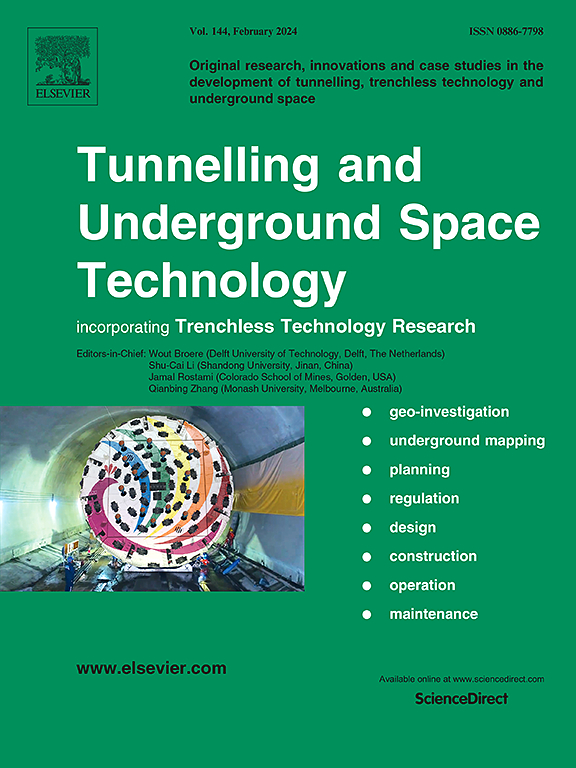Mechanical behaviour of double lining with outer segmental lining and inner fibre reinforced concrete lining under internal water pressure
IF 7.4
1区 工程技术
Q1 CONSTRUCTION & BUILDING TECHNOLOGY
引用次数: 0
Abstract
Double lining with outer segmental lining and inner reinforced concrete lining is extensively used for water conveyance tunnel with internal water pressure. In order to improve the performance of the double lining, the steel rebar and fibre reinforced concrete (R/FRC) is designed for inner lining to enhance the tensile strength of reinforced concrete (RC). Full-scale tests were conducted to compare the mechanical behaviour of double lining with inner RC and R/FRC linings. The test results showed that both types of lining failed in four stages: elastic stage, inner lining cracking stage, crack stabilization and segmental joint damage stage, and failure stage. The cracks firstly occurred in the inner lining near the segmental joints and then propagated to the whole inner lining ring. Finally, the crack width and segmental joint opening successively exceeded the thresholds, and the double lining failed until the breaking of segmental joints. Compared with inner RC lining, R/FRC lining had better performance in terms of the initial cracking load, cracking-control ability, post-cracking stiffness, service limit capacity of inner lining and waterproof capacity of segmental lining. The improvement ratios were 36.3%, 50.3%, 46.3%, 37.2% and 31.1%, respectively. The influences of fibre volume fraction, fibre aspect ratio, and reinforcement ratio of steel rebar on the mechanical performance of R/FRC lining were also investigated based on a previously proposed analytical model. The parametric analysis demonstrated that higher fibre volume fraction and fibre aspect ratio can result in more significant increase of mechanical performance of R/FRC lining. The steel fibres were found to have more significant effects on the post-cracking behaviour of the lining than same amounts of reinforcing bars. Finally, an optimized function was proposed to fulfil a balance of lining performance and economy. The experimental and analytical results indicated that R/FRC lining can substitute RC lining and perform higher mechanical performance in water conveyance tunnels.
在内部水压作用下,外层为分段式衬里、内层为纤维增强混凝土衬里的双层衬里的力学性能
外段式衬砌和钢筋混凝土内衬的双层衬砌被广泛应用于具有内部水压的输水隧道。为了提高双层衬砌的性能,设计了钢筋和纤维增强混凝土(R/FRC)内衬,以提高钢筋混凝土(RC)的抗拉强度。为比较内衬 RC 和 R/FRC 的双衬里的机械性能,进行了全尺寸试验。试验结果表明,两种类型的衬里都在四个阶段失效:弹性阶段、内衬开裂阶段、裂缝稳定和节段连接破坏阶段以及失效阶段。裂纹首先出现在内衬分段接缝附近,然后扩展到整个内衬环。最后,裂缝宽度和分段接缝开度相继超过临界值,双层衬砌失效,直至分段接缝断裂。与内RC衬砌相比,R/FRC衬砌在初始开裂荷载、开裂控制能力、开裂后刚度、内衬使用极限承载力和分段衬砌防水承载力方面都有更好的表现。改善率分别为 36.3%、50.3%、46.3%、37.2% 和 31.1%。根据之前提出的分析模型,还研究了纤维体积分数、纤维长宽比和钢筋配筋率对 R/FRC 衬里机械性能的影响。参数分析表明,纤维体积分数和纤维长宽比越高,R/FRC 衬里的机械性能就越明显。与相同数量的钢筋相比,钢纤维对衬里开裂后行为的影响更为显著。最后,提出了一种优化功能,以实现衬里性能和经济性之间的平衡。实验和分析结果表明,R/FRC 衬里可替代 RC 衬里,在输水隧道中具有更高的机械性能。
本文章由计算机程序翻译,如有差异,请以英文原文为准。
求助全文
约1分钟内获得全文
求助全文
来源期刊

Tunnelling and Underground Space Technology
工程技术-工程:土木
CiteScore
11.90
自引率
18.80%
发文量
454
审稿时长
10.8 months
期刊介绍:
Tunnelling and Underground Space Technology is an international journal which publishes authoritative articles encompassing the development of innovative uses of underground space and the results of high quality research into improved, more cost-effective techniques for the planning, geo-investigation, design, construction, operation and maintenance of underground and earth-sheltered structures. The journal provides an effective vehicle for the improved worldwide exchange of information on developments in underground technology - and the experience gained from its use - and is strongly committed to publishing papers on the interdisciplinary aspects of creating, planning, and regulating underground space.
 求助内容:
求助内容: 应助结果提醒方式:
应助结果提醒方式:


